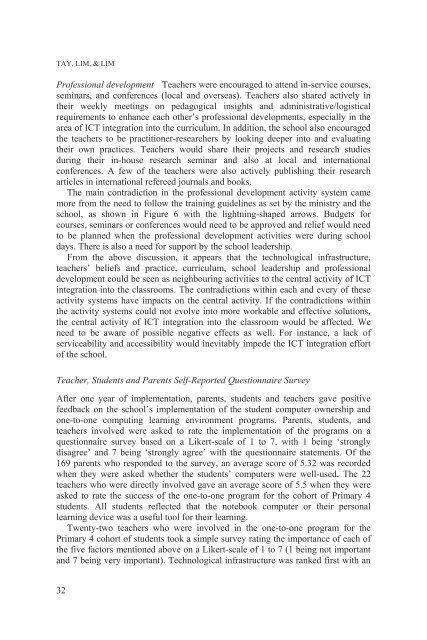1517-creating-holistic-technology-enhanced-learning-experiences
1517-creating-holistic-technology-enhanced-learning-experiences
1517-creating-holistic-technology-enhanced-learning-experiences
You also want an ePaper? Increase the reach of your titles
YUMPU automatically turns print PDFs into web optimized ePapers that Google loves.
TAY, LIM, & LIM<br />
Professional development Teachers were encouraged to attend in-service courses,<br />
seminars, and conferences (local and overseas). Teachers also shared actively in<br />
their weekly meetings on pedagogical insights and administrative/logistical<br />
requirements to enhance each other’s professional developments, especially in the<br />
area of ICT integration into the curriculum. In addition, the school also encouraged<br />
the teachers to be practitioner-researchers by looking deeper into and evaluating<br />
their own practices. Teachers would share their projects and research studies<br />
during their in-house research seminar and also at local and international<br />
conferences. A few of the teachers were also actively publishing their research<br />
articles in international refereed journals and books.<br />
The main contradiction in the professional development activity system came<br />
more from the need to follow the training guidelines as set by the ministry and the<br />
school, as shown in Figure 6 with the lightning-shaped arrows. Budgets for<br />
courses, seminars or conferences would need to be approved and relief would need<br />
to be planned when the professional development activities were during school<br />
days. There is also a need for support by the school leadership.<br />
From the above discussion, it appears that the technological infrastructure,<br />
teachers’ beliefs and practice, curriculum, school leadership and professional<br />
development could be seen as neighbouring activities to the central activity of ICT<br />
integration into the classrooms. The contradictions within each and every of these<br />
activity systems have impacts on the central activity. If the contradictions within<br />
the activity systems could not evolve into more workable and effective solutions,<br />
the central activity of ICT integration into the classroom would be affected. We<br />
need to be aware of possible negative effects as well. For instance, a lack of<br />
serviceability and accessibility would inevitably impede the ICT integration effort<br />
of the school.<br />
Teacher, Students and Parents Self-Reported Questionnaire Survey<br />
After one year of implementation, parents, students and teachers gave positive<br />
feedback on the school’s implementation of the student computer ownership and<br />
one-to-one computing <strong>learning</strong> environment programs. Parents, students, and<br />
teachers involved were asked to rate the implementation of the programs on a<br />
questionnaire survey based on a Likert-scale of 1 to 7, with 1 being ‘strongly<br />
disagree’ and 7 being ‘strongly agree’ with the questionnaire statements. Of the<br />
169 parents who responded to the survey, an average score of 5.32 was recorded<br />
when they were asked whether the students’ computers were well-used. The 22<br />
teachers who were directly involved gave an average score of 5.5 when they were<br />
asked to rate the success of the one-to-one program for the cohort of Primary 4<br />
students. All students reflected that the notebook computer or their personal<br />
<strong>learning</strong> device was a useful tool for their <strong>learning</strong>.<br />
Twenty-two teachers who were involved in the one-to-one program for the<br />
Primary 4 cohort of students took a simple survey rating the importance of each of<br />
the five factors mentioned above on a Likert-scale of 1 to 7 (1 being not important<br />
and 7 being very important). Technological infrastructure was ranked first with an<br />
32


